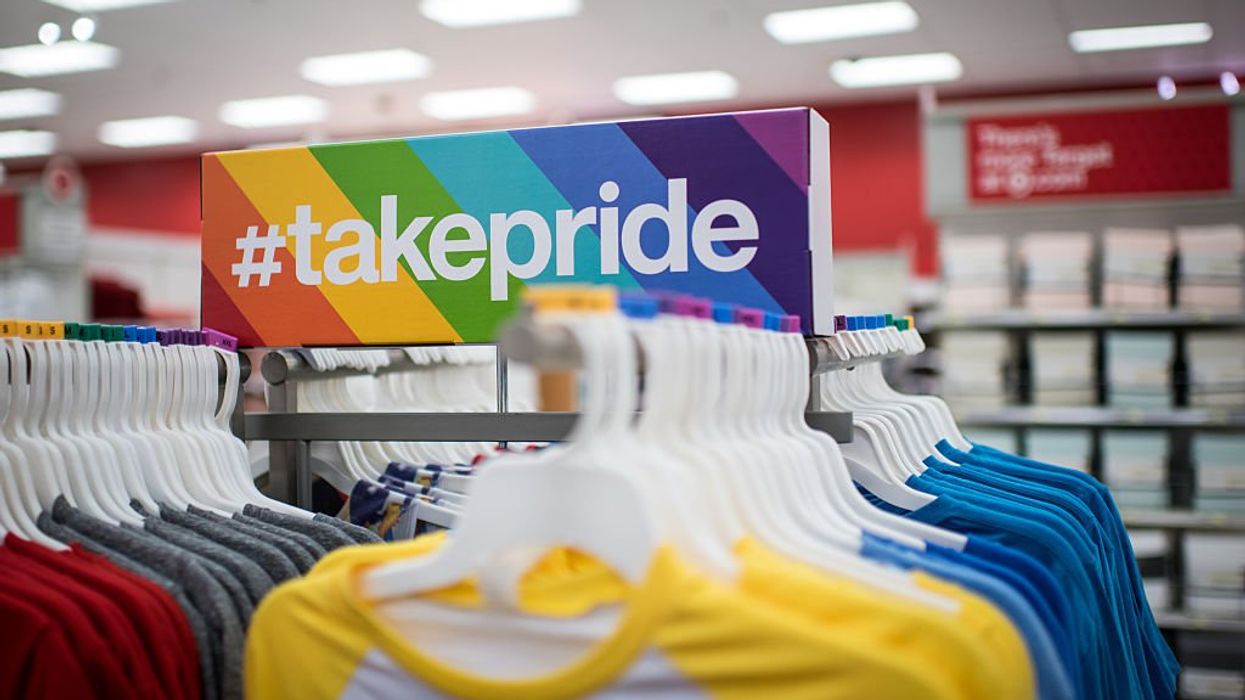The difference between what happened in Boston in the wake of the Boston Marathon explosion and what is happening now in Ferguson, Missouri, is not in the government’s response but in the community’s response.
This is what happens when you ignore the warning signs.
This is what happens when you fail to take alarm at the first experiment on your liberties.
This is what happens when you fail to challenge injustice and government overreach until the prison doors clang shut behind you.
Consider that it was just a little over a year ago that the city of Boston was locked down while police carried out a military-style manhunt for the suspects in the Boston Marathon explosion. At the time, Americans welcomed the city-wide lockdown, the routine invasion of their privacy, and the dismantling of every constitutional right intended to serve as a bulwark against government abuses.
 Members of a police SWAT team talk to a man while conducting a door-to-door search for 19-year-old Boston Marathon bombing suspect Dzhokhar A. Tsarnaev on April 19, 2013 in Watertown, Massachusetts. After a car chase and shoot out with police, one suspect in the Boston Marathon bombing, Tamerlan Tsarnaev, 26, was shot and killed by police early morning April 19, and a manhunt is underway for his brother and second suspect, 19-year-old Dzhokhar A. Tsarnaev. The two men are suspects in the bombings at the Boston Marathon on April 15, that killed three people and wounded at least 170. (Photo: Spencer Platt/Getty Images)
Members of a police SWAT team talk to a man while conducting a door-to-door search for 19-year-old Boston Marathon bombing suspect Dzhokhar A. Tsarnaev on April 19, 2013 in Watertown, Massachusetts. After a car chase and shoot out with police, one suspect in the Boston Marathon bombing, Tamerlan Tsarnaev, 26, was shot and killed by police early morning April 19, and a manhunt is underway for his brother and second suspect, 19-year-old Dzhokhar A. Tsarnaev. The two men are suspects in the bombings at the Boston Marathon on April 15, that killed three people and wounded at least 170. (Photo: Spencer Platt/Getty Images)
Fast forward 14 months, and Americans are shocked at the tactics being employed to quell citizen unrest in Ferguson, Missouri - a massive SWAT team, an armored personnel carrier, men in camouflage pointing heavy artillery at the crowd, smoke bombs and tear gas. Residents are outraged and in the streets in response to a recent police shooting of one of their own: a young, unarmed college-bound black teenager who had the misfortune of being in the wrong place at the wrong time.
Here’s the problem, though, as I explain in my book "A Government of Wolves: The Emerging American Police State," in the American police state that now surrounds us, every time and every place is the wrong time and the wrong place, especially if you still believe you have the right to be presumed innocent until proven guilty by a court of law.
In the American police state, there is no longer such a thing as innocence. We are all potentially guilty, all potential criminals, all suspects waiting to be accused of a crime.
Why is this happening?
Why is it that not a week goes by without more reports of hair-raising incidents by militarized police imbued with a take-no-prisoners attitude and a battlefield approach to the communities in which they serve?
Who or what is responsible for the growing spate of police shootings, brutality and overreach?
 Tactical officers fire tear gas on Monday, Aug. 11, 2014, in Ferguson, Mo. Authorities in Ferguson used tear gas and rubber bullets to try to disperse a large crowd Monday night that had gathered at the site of a burned-out convenience store damaged a night earlier, when many businesses in the area were looted. (AP Photo/St. Louis Post-Dispatch, Robert Cohen)
Tactical officers fire tear gas on Monday, Aug. 11, 2014, in Ferguson, Mo. Authorities in Ferguson used tear gas and rubber bullets to try to disperse a large crowd Monday night that had gathered at the site of a burned-out convenience store damaged a night earlier, when many businesses in the area were looted. (AP Photo/St. Louis Post-Dispatch, Robert Cohen)
As journalist Benjamin Carlson points out, “In today’s Mayberry, Andy Griffith and Barney Fife could be using grenade launchers and a tank to keep the peace.”
This is largely owing to the increasing arsenal of weapons available to police units, the changing image of the police within communities, and the growing idea that the police can and should use any means necessary to maintain order.
To our detriment, local police - clad in jackboots, helmets and shields and wielding batons, pepper-spray, stun guns, and assault rifles - have increasingly come to resemble occupying forces in our communities. “Today,” notes Paul Craig Roberts, former Assistant Secretary of the Treasury, “17,000 local police forces are equipped with such military equipment as Blackhawk helicopters, machine guns, grenade launchers, battering rams, explosives, chemical sprays, body armor, night vision, rappelling gear and armored vehicles. Some have tanks. ”
Unfortunately, whatever the threat to so-called security - whether it’s rumored weapons of mass destruction, school shootings, or alleged acts of terrorism - it doesn’t take much for the American people to march in lockstep with the government’s dictates, even if it means submitting to martial law, having their homes searched, and being stripped of one’s constitutional rights at a moment’s notice.
Americans will march in lockstep with the police state, that is, until suddenly they are the ones being held at gunpoint, terrorized and stripped of their rights. At that point, as Ferguson makes clear, it’s almost too late to dial back the police state.
So what’s to be done?
As with all things, change must start locally - in your hometown.
 Tactical officers fire tear gas on Monday, Aug. 11, 2014, in Ferguson, Mo. Authorities in Ferguson used tear gas and rubber bullets to try to disperse a large crowd Monday night that had gathered at the site of a burned-out convenience store damaged a night earlier, when many businesses in the area were looted. (AP Photo/St. Louis Post-Dispatch, Robert Cohen)
Tactical officers fire tear gas on Monday, Aug. 11, 2014, in Ferguson, Mo. Authorities in Ferguson used tear gas and rubber bullets to try to disperse a large crowd Monday night that had gathered at the site of a burned-out convenience store damaged a night earlier, when many businesses in the area were looted. (AP Photo/St. Louis Post-Dispatch, Robert Cohen)
For instance, take a close look at your local police officers, the ones who patrol your neighborhoods and ensure the safety of your roadways. Chances are they look less and less like the benevolent keepers of the peace who patrolled Andy Griffith’s Mayberry and more like inflexible extensions of the military.
Who calls the shots for your local police? Who do they answer to? Who provides oversight for their interactions with local police? What drives the decision-making process for your local police - revenue or the rule of law? How transparent are your local police about their activities, their equipment and their processes?
In other words, who polices your local police? If it’s more police or politicians benefiting from revenue-generating programs by the police, that’s no answer.
These are just a few of the questions we should all be asking of our local police and governing bodies. And when the answers don’t satisfy, we should ask them louder and insist that changes be implemented immediately to ensure that it is “we the people” calling the shots in our hometowns and not armed extensions of the police state.
Remember, a police state does not come about overnight. It starts small, perhaps with a revenue-generating red light camera at an intersection. When that is implemented without opposition, perhaps next will be surveillance cameras on public streets. License plate readers on police cruisers. More police officers on the beat. Free military equipment from the federal government. Free speech zones and zero tolerance policies and curfews. SWAT team raids. Drones flying overhead.
No matter how it starts, however, it always ends the same. Remember, it’s a slippery slope from a questionable infringement justified in the name of safety to all-out tyranny.
Constitutional attorney John W. Whitehead is founder and president of The Rutherford Institute and author of "A Government of Wolves: The Emerging American Police State." Whitehead can be contacted at johnw@rutherford.org.
–
TheBlaze contributor channel supports an open discourse on a range of views. The opinions expressed in this channel are solely those of each individual author.


 Members of a police SWAT team talk to a man while conducting a door-to-door search for 19-year-old Boston Marathon bombing suspect Dzhokhar A. Tsarnaev on April 19, 2013 in Watertown, Massachusetts. After a car chase and shoot out with police, one suspect in the Boston Marathon bombing, Tamerlan Tsarnaev, 26, was shot and killed by police early morning April 19, and a manhunt is underway for his brother and second suspect, 19-year-old Dzhokhar A. Tsarnaev. The two men are suspects in the bombings at the Boston Marathon on April 15, that killed three people and wounded at least 170. (Photo: Spencer Platt/Getty Images)
Members of a police SWAT team talk to a man while conducting a door-to-door search for 19-year-old Boston Marathon bombing suspect Dzhokhar A. Tsarnaev on April 19, 2013 in Watertown, Massachusetts. After a car chase and shoot out with police, one suspect in the Boston Marathon bombing, Tamerlan Tsarnaev, 26, was shot and killed by police early morning April 19, and a manhunt is underway for his brother and second suspect, 19-year-old Dzhokhar A. Tsarnaev. The two men are suspects in the bombings at the Boston Marathon on April 15, that killed three people and wounded at least 170. (Photo: Spencer Platt/Getty Images)
 Tactical officers fire tear gas on Monday, Aug. 11, 2014, in Ferguson, Mo. Authorities in Ferguson used tear gas and rubber bullets to try to disperse a large crowd Monday night that had gathered at the site of a burned-out convenience store damaged a night earlier, when many businesses in the area were looted. (AP Photo/St. Louis Post-Dispatch, Robert Cohen)
Tactical officers fire tear gas on Monday, Aug. 11, 2014, in Ferguson, Mo. Authorities in Ferguson used tear gas and rubber bullets to try to disperse a large crowd Monday night that had gathered at the site of a burned-out convenience store damaged a night earlier, when many businesses in the area were looted. (AP Photo/St. Louis Post-Dispatch, Robert Cohen)
 Tactical officers fire tear gas on Monday, Aug. 11, 2014, in Ferguson, Mo. Authorities in Ferguson used tear gas and rubber bullets to try to disperse a large crowd Monday night that had gathered at the site of a burned-out convenience store damaged a night earlier, when many businesses in the area were looted. (AP Photo/St. Louis Post-Dispatch, Robert Cohen)
Tactical officers fire tear gas on Monday, Aug. 11, 2014, in Ferguson, Mo. Authorities in Ferguson used tear gas and rubber bullets to try to disperse a large crowd Monday night that had gathered at the site of a burned-out convenience store damaged a night earlier, when many businesses in the area were looted. (AP Photo/St. Louis Post-Dispatch, Robert Cohen)

